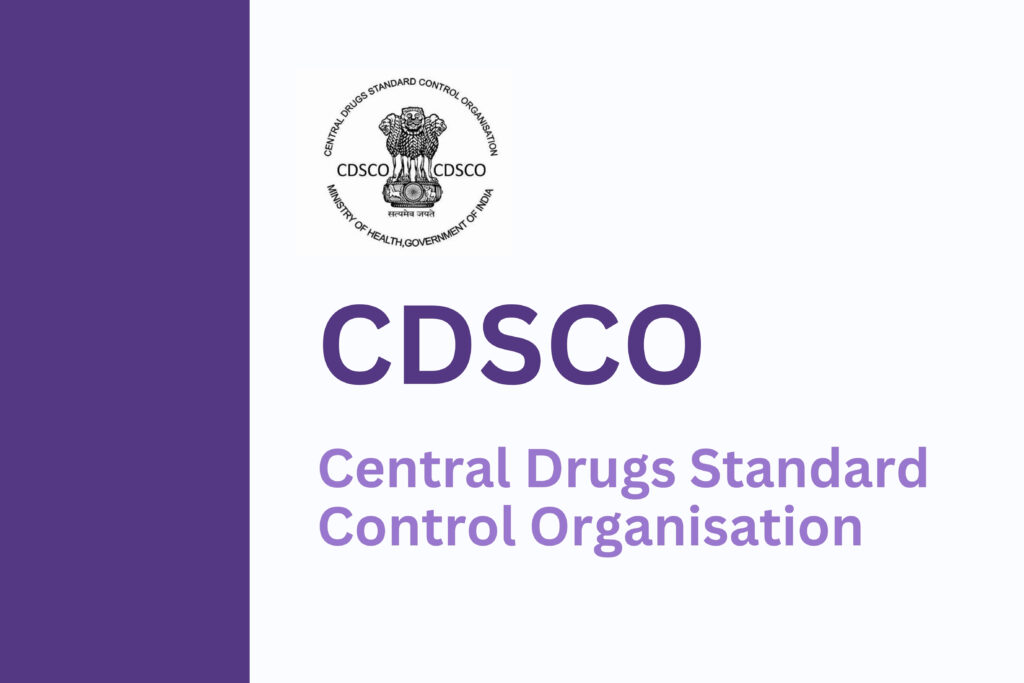Different divisions of the CDSCO are as below:

CDSCO Registration Consultant
About Central Drugs Standard Control Organisation (CDSCO):
The Central Drugs Standard Control Organisation (CDSCO) is the central regulatory authority in India responsible for overseeing the regulation of pharmaceuticals, medical devices, cosmetics, and biological products, ensuring their safety, efficacy, and quality. Here’s an overview of the different divisions within CDSCO:
The Central Drugs Standard Control Organisation (CDSCO) is the central regulatory authority in India responsible for overseeing the regulation of pharmaceuticals, medical devices, cosmetics, and biological products, ensuring their safety, efficacy, and quality. Here’s an overview of the different divisions within CDSCO:
- Medical Device Division: This division focuses on regulating medical devices to ensure they meet safety and efficacy standards before being marketed or used in India.
- Drugs: CDSCO regulates pharmaceutical drugs to ensure they are safe, effective, and of good quality, in accordance with the Drugs and Cosmetics Act and Rules.
- Cosmetics: This division regulates cosmetic products to ensure their safety and quality for consumer use.
- Clinical Trial on Medical Devices Division: Responsible for overseeing and regulating clinical trials conducted on medical devices in India. This includes ensuring ethical standards and compliance with regulatory requirements.
- Vaccines: CDSCO is involved in regulating vaccines to ensure their safety, efficacy, and quality, particularly important in the context of public health.
Each division operates within the framework of the Drugs and Cosmetics Act and Rules, conducting inspections, issuing licenses, and monitoring compliance with regulatory standards. CDSCO’s zonal and sub-zonal offices, along with laboratories, play crucial roles in enforcement and regulatory activities across the country.
Major functions of CDSCO:
The Central Drugs Standard Control Organization (CDSCO) in India plays a crucial role in the regulation and control of drugs and cosmetics. Here are the major functions of CDSCO based on the provided information:
Regulatory Control over Import of Drugs: CDSCO regulates and controls the import of drugs into India to ensure they meet the necessary standards and regulations.
Approval of New Drugs: CDSCO is responsible for the approval of new drugs before they can be marketed and sold in India. This involves evaluating their safety, efficacy, and quality based on data from clinical trials.
Approval of Clinical Trials: Before any new drug can be tested on human subjects in India, CDSCO must approve the clinical trial protocols to ensure ethical and scientific standards are met.
Meetings of Drugs Consultative Committee (DCC) and Drugs Technical Advisory Board (DTAB): CDSCO convenes meetings of these committees to discuss and advise on various regulatory and technical matters related to drugs and cosmetics.
Approval of Certain Licenses: CDSCO, through its headquarters, acts as the Central License Approving Authority for certain categories of licenses related to drugs and cosmetics.
Setting Standards for Drugs: CDSCO lays down standards and specifications for drugs to ensure their quality, safety, and efficacy.
Quality Control of Imported Drugs: CDSCO exercises control over the quality of drugs imported into India, ensuring they comply with Indian standards and regulations.
Coordination with State Drug Control Organizations: CDSCO provides expert advice and coordinates with state-level drug control organizations to ensure uniform enforcement of the Drugs and Cosmetics Act across the country.
Medical Device Import License by CDSCO:
In India, the regulation of medical devices falls under the purview of the Drugs and Cosmetics Act, 1940 and its Rules. Here’s a breakdown based on the information provided:
Notified Medical Devices: Currently, only certain medical devices are regulated as drugs under the Drugs and Cosmetics Act, 1940. These include:
Substances used for in vitro diagnosis: This category includes substances used in diagnostic tests conducted outside the body (in vitro).
Surgical dressings, surgical bandages, staples, sutures, ligatures: Items used in surgical procedures and wound care.
Blood and blood component collection bags: These may include anticoagulant-coated bags used for blood collection and storage.
Substances notified under sub-clause (ii): This includes various substances such as mechanical contraceptives (condoms, intrauterine devices, tubal rings), disinfectants, and insecticides that are notified by the authorities.
Devices notified under sub-clause (iv): This refers to medical devices that are notified from time to time under clause (b) of section 3 of the Drugs and Cosmetics Act, 1940. This category encompasses other medical devices that are specifically brought under regulation as per notifications issued by CDSCO.
The regulation of medical devices is evolving in India, driven by factors such as advancements in medical technology, the increasing role of hospitals, growth in medical tourism, and the expanding scope of healthcare services. CDSCO plays a crucial role in ensuring that these devices meet regulatory standards for safety, efficacy, and quality before they can be imported, manufactured, or marketed in the country.
For stakeholders in the medical device industry, compliance with CDSCO regulations is essential to ensure market access and maintain standards that protect public health and safety.

